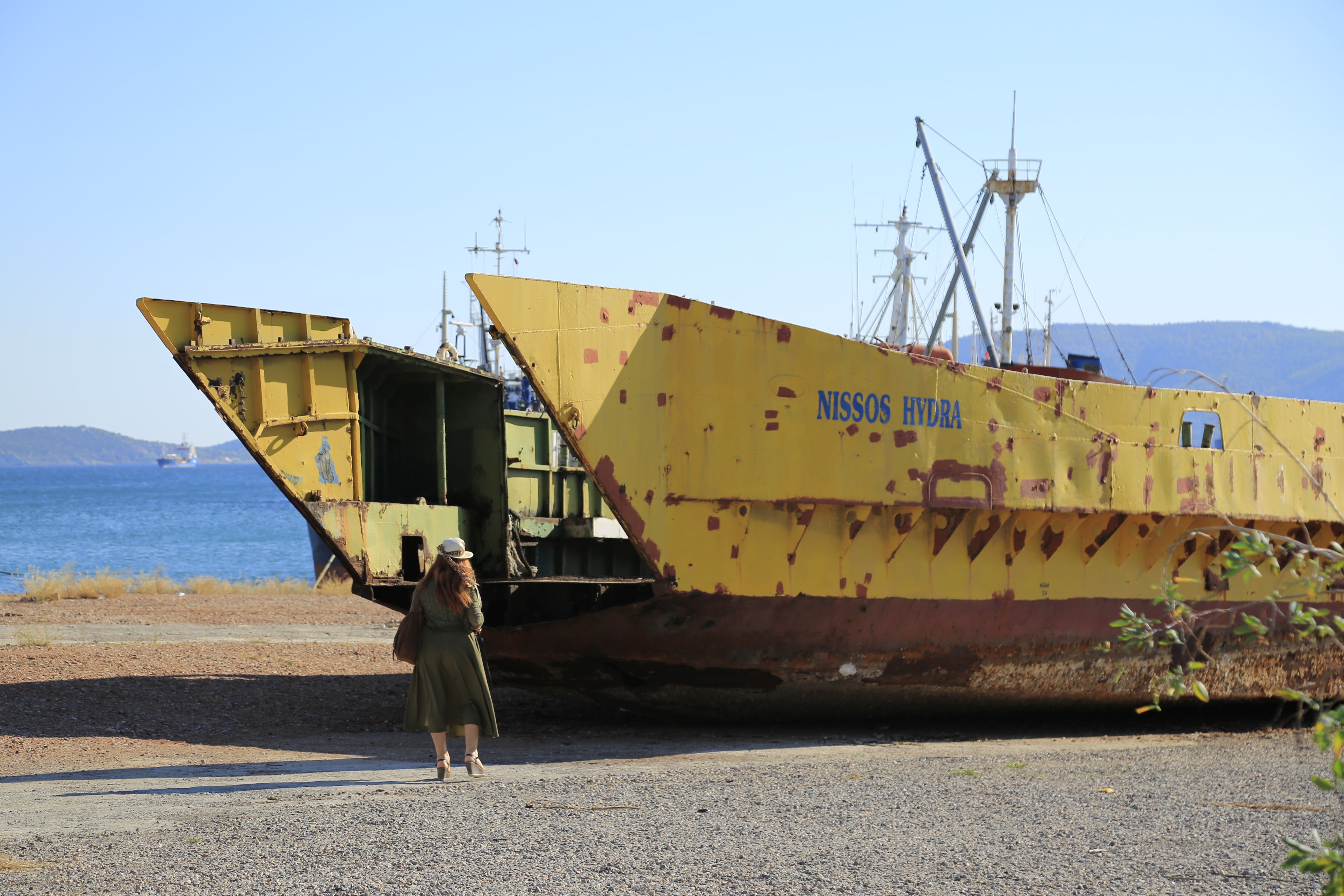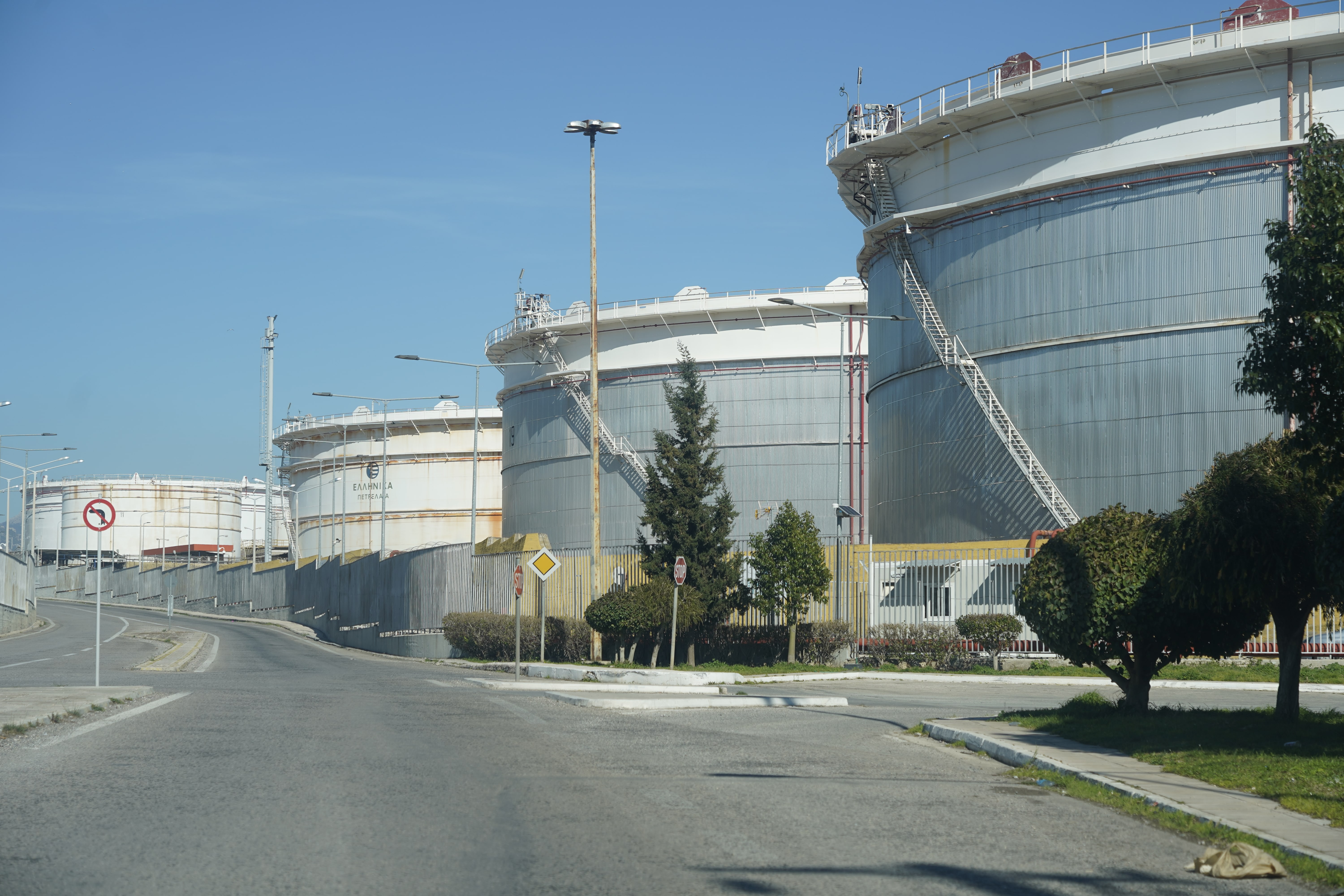In the end of the 19th century, a group of young visionaries decided to exploit the advantages of Lepsina, as the community was known at the time, and establish impressive and pioneering factories, linking the course of the city inextricably with industrial development.
An industrial city
Eleusis is emerging as the epicentre of the trade routes of the Peloponnese and Central Greece, a port of international importance and a destination for thousands of people seeking well-paid jobs in the emerging industrial sector. The labour movement that developed from the rallying of industrial workers gave bloody struggles for the improvement of working conditions and marked the history of the city. The silent ruins of the once bustling factories remain witnesses to the endless dynamism of this place.
Environmental degradation
Industrial activity over the decades has contributed to the degradation of the environment, causing a range of problems, including atmospheric and water pollution. The extensive ecological destruction was largely driven by the concentration of high-noise industrial units (e.g., PETROLA, Hellenic Refineries of Aspropyrgos, and steel manufacturing), the discharge of wastewater from the Athens area into the Saronic Gulf, and the movement, shipbuilding, and docking of vessels. To this day, the city remains one of the country's most significant industrial production centres, emphasising the need to identify sustainable practices.
Recent measurements have revealed that high concentrations of atmospheric pollutants are primarily attributed to industrial activities, with secondary contributions from car traffic and noise pollution. Furthermore, the historical discharge of industrial waste into the sea, combined with the sedimentation of petroleum products, has resulted in a layer of oil covering the seabed, leading to detrimental consequences for the purification of the Gulf of Eleusis and the ecological cycle of the ecosystem.
The Impact on Residents' Lives
The adverse impact on the quality of life of the residents is observed on multiple levels. On the one hand, there is a particularly increased risk of cancer for citizens due to persistent organic pollutants, primarily from the emissions of industrial facilities, on the other hand episodes of intense odour that can be attributed to petroleum products.
Industrial installations occupy the majority of the coastline of the Municipality of Eleusis, while most of the shoreline accessible to citizens is configured as a "vertical front," increasing the difficulty of access to the coastal area. Consequently, the number of beaches considered suitable for swimming is limited.
Local Environmental Awareness and Advocacy
On the other hand, the environmental consciousness of the local community is shaped within this context and is informed by shared experiences of living a life exposed to risks, the internal tension between health protection and work, and demands for an improvement in the standard of living.
The pressure from the people of Eleusis, who suffered intense discomfort from the cement dust settling in their homes, courtyards, and lungs, led to the introduction of electrostatic filters in the chimneys of the TITAN factory, under the then technical director of the factory, Andreas Patrinos.
Today, local environmental movements turn their attention to the Gulf of Eleusis and, beyond the occasional and insufficient removal of hazardous ships and shipwrecks, raise a holistic demand for modernising the management of the water and marine environment through the installation of a sewage network and a municipal wastewater treatment system in the Thracean Plain, the implementation of hydraulic and flood control projects, particularly after the destructive floods of 2017, the consolidation of port activities, and their relocation outside the urban area.
The dominant emotions of the participants are a sense of belonging, love for the city, and pride for the unique character and symbols of the place (the Archaeological Site's clock, the Old Olive Oil Factory, the Morphopoulos house, the departing daughter, etc.). One of these symbols is the sea, the love for which is experienced through sadness and anger due to the difficulties that the people of Eleusis face in accessing it. Furthermore, there is a shared recognition that industrial activity strengthens the city's proud identity as working-class.
Industry has a predominant presence in narratives about the environment, evoking strong negative and positive emotions. With the symbolic culmination of ELPE (Hellenic Petroleum), industry is often perceived as the source of evil, the absolute exercise of power in the lives of residents, and a permanent source of pollution and environmental degradation. On the other hand, there is common recognition that industrial activity provides job opportunities, contributes to the economic survival and development of the area, and strengthens the city's working-class identity.
The neglect and abandonment of the city's landmarks, partly a result of deindustrialization, provoke feelings of sadness, anger, and disappointment. In some cases, these emotions lead to resignation, apathy, stagnation, and isolation, since "this city eats its children", the reflection of which, on an individual level, is accompanied by feelings of helplessness, detachment and loneliness.
Nostalgia is a strong sentiment expressed in the participants' discourse, ranging from nostalgia for the old Eleusis, its tranquillity and peace, to the lost symbols and the city's lost identity. This sentiment, beyond being an obstacle to collective transition into the future, represents an individual attachment to personal memories that hinders the connection of residents with each other and their synthesis into a "here and now" collective identity.
Finally, there is a clear expression of the need for connection with the city and fellow citizens, as well as the initiation of collective action in the context of common visions and concerns about the future of Eleusis.
Two sessions were held to address the issue of the environment, each actively involving 12-15 individuals, 6 of whom wore biometric sensors to measure the following biometrics:
The biometrics recorded by the researchers were:
Heart Rate (HR)
Skin Conductance (SC)
Temperature (Temp)
After the analysis of the socio-drama sessions, 8 different axes emerged, exploring a range of emotions regarding the city's environment, the relationship between citizens and the city itself, emotions related to industrial activity, and how the citizen is portrayed as an individual and as part of a collective.
Each axis serves as a digital mood board that includes research findings in various forms and functions as primary material for contemporary artistic creation. Sixteen artists were invited to create one work for each axis within each theme.
You can view the works here.
The timeline includes significant dates and important historical events that have shaped the urban environment and the natural landscape of the city.
The brothers Harilaou, members of the Greek community in Romania, establish the homonymous soap factory, which operates until 1960. Today it is known as the Old Olive Oil Factory, it houses the only open theatre in the city and is used for artistic activities.
A second soap factory is founded by the Hatzilias - Doxaras brothers.
The chemist Epaminondas Charilaos takes over the management of the family soap factory with Nikolaos Kanellopoulos as a partner. The factory turns a page and from a small-scale unit of 20 employees becomes a thriving business of 90 people, producing 640,000 kg of soap per year, an exportable product to the Mediterranean countries.
Epaminondas Charilaos founds the Harilaos and SIA Wine and Spirit Company in collaboration with Leo Economides. The factory is built to the north-west of the Olive Oil Mill-Saponery.
One of the largest and most important heavy industrial units in Greece, the cement industry "TITAN", is founded in Eleusis. It is built on the advantages of the city: the sea through which the raw material is transported, the coastal hills, ideal for the extraction of marl and the cheap labour of the region.
The Wine and Spirit Company Charilaos and Co. is renamed Votris. It produced wine, vermouth, cognac, and carbon disulphide.
As a result of the merger of the Hellenic Pyritide, Chemical and Industrial Products Company and the Maltsiniotis brothers' Pottery, “PYRKAL” was created. It will operate until the beginning of the 21st century, playing a dominant role in the defence armouring of the country.
KRONOS is founded, better known as the Public Limited Liquor Company.
Menelaos Sakellariou founded the first varnish industry in Greece under the name of Chemical Paint and Varnish Factory IRIS S.A. - Menelaos Sakellariou and Co., which flourished in the 1950s. It closed down shortly before 1970.
The "Olive Oil - Central Cooperative Union of Olive Oil Producers of Greece" is founded. The first factory operates at the old premises of the Hatzimeletis soap factory.
Chalyvourgiki S.A. is transferred from Piraeus Street to the coastal zone of Eleusis.
The Greek government signs the contract for the construction of the Aspropyrgos refinery. One year later, construction of the plant begins, which will be inaugurated in 1958.
Following pressure from citizens, Titan introduces, for the first time in Greece, electrostatic filters for the protection of the environment.
The Central Sewer of Athens is created, which discharges the wastewater of the capital's population to Keratsini, with the result that 20% of the wastewater passes into the closed bay of Eleusis, through the eastern, narrow, and shallow, communication channel of the two bays.
The Olive Factory-Soap Factory closes, and the land becomes the property of the National Bank of Greece.
In the 1960s, small units were established, such as the Gastouniotis Ice Factory, E.B.P.A., EDOK - ETER, Savvas Shipyards.
The PETROGAZ facility is inaugurated.
The Titan plant in Eleusis is expanded.
The Eleusis shipyards are founded by Stratis Andreadis.
The Hellenic Glassworks of Eleusis-Owens is founded. Two years later, production begins.
The Ioannis Latsis Group inaugurates the Petrola Hellas refinery in Eleusis with a temporary operating licence.
The operating licence of PETROLA SA becomes permanent. This is the current HELPE, located on the edge of the city, next to PYRKAL which they bought in 2017.
The highest levels of water pollution in the history of the Gulf of Eleusis are recorded, earning the shameful title of the most polluted sea in the Mediterranean due to the central sewage pipeline of Athens, industrial waste from fertilizer, refineries, metallurgy, cement, distilleries, distilleries, dye works, etc., shipbuilding, repair, and dismantling of ships.
The IRIS factory closes down.
The amount of goods handled from and to the port of Eleusis, on the north coast of the bay, is three times the amount of the port of Piraeus.
The port of Eleusis is once again in the lead, hosting 70% of the country's decommissioned ships.
The Kronos factory closes down.
The Wastewater Treatment Centre operates in Psyttaleia (a small island in the Saronic Gulf between Salamis and Piraeus, known for the Battle of Salamis). This is where Attica's wastewater is biologically treated, leading to a 35% reduction in the environmental footprint of the K.A.A. (Central Sewerage Pipeline), an effort by the country to align with the EU directive to protect the country's water environment
The company PETROLA HELLAS S.A. is merged with HELLENIC PETROLEUM S.A., through which the Group acquires the Eleusis refinery.
Titan closes its white cement production plant in Eleusis. It maintains the port facilities to serve the Kamari plant (Boeotia). It announces the 'Road Map for the future redevelopment of the Eleusis plant', which remains unused to this day.
The Bakopoulos shipbreaking yard in Kalymbaki closes down. Two years later (2016), the Savvas shipbreaker in Vlycha is closed.
PYRKAL closes down, ending three decades of underperformance. The facilities and the 400-acre plot of land are purchased by HELPE.
The Halyvourgia (Steelworks) closes, which employed about 600 workers, while during its heyday in the 1970s it employed more than four times as many workers.
Eleusis Shipyards is acquired by the US-based ONEX.
413 Eleusinians, 170 men and 243 women assess the environmental situation of the city.
75%
of participants rated air quality as annoying.
88.8%
consideres marine pollution severe.
92.5%
describes marine pollution as a nuisance.
84.9%
assesses the number of shipwrecks in the bay of Eleusis as high.
2.5%
considers the number of shipwrecks to be small.
79.9%
argues that the natural landscape of the place has been altered.
89.4%
is abhorred by the industrial tone that has taken over the city's landscape.












